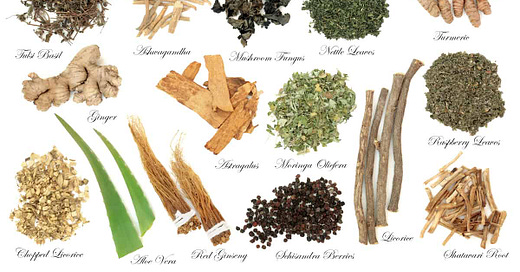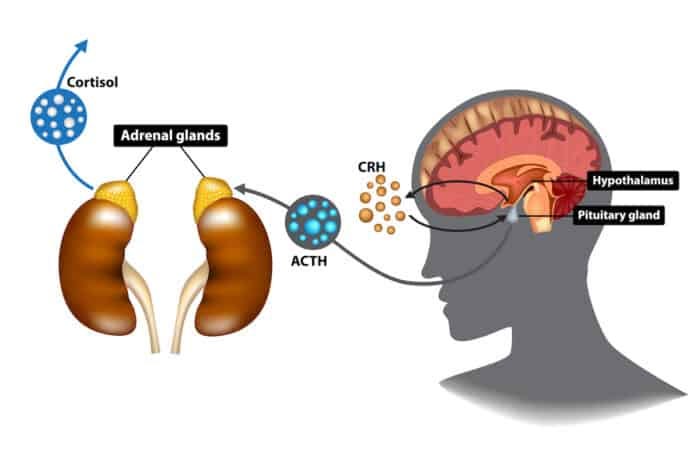Two Wonderful Herbs to Naturally Reduce Stress
How a simple tea made with adaptogenic herbs, tulsi or ashwagandha, can help reduce stress
No one wants to rely on heavy pharmaceuticals unless it’s absolutely necessary.
“Roughly one in five adults aged 40 to 79 take at least five prescription drugs, according to Centers for Disease Control and Prevention data. Some have effects that make us more susceptible to getting sick, plus other side effects.”
—WSJ
Here’s the truth—very few medications actually eliminate the root cause of disease. Antibiotics, antivirals, antiparasitics, and antifungals attack and kill the pathogens and parasites causing illness. But the rest? They’re just managing the symptoms. Think about that.
Adaptogenic teas
Adaptogenic tea blends are becoming more common as people seek natural substances to reduce stress and provide health benefits. Adaptogens are botanical substances, such as tulsi, ashwagandha, rhodiola, and maca.
You may be more familiar with common adaptogens, such as turmeric and ginger. These herbs balance, restore and protect the body from physical, biochemical, and mental stress.
Of course, my favorite adaptogenic is tea from the Camellia Sinensis plant. Tea is mildly stimulating, with a balance of energizing caffeine and the calming amino acid L-theanine, producing a state of well-being in the body and mind.
L-theanine: The Beneficial Amino Acid Found Only in Tea
What are adaptogens?
Adaptogens are components of herbal medicines that help the body's resilience in dealing with physical and emotional stresses.
adaptogen
adap·to·gen ə-ˈdap-tə-jən
: a nontoxic substance and especially a plant extract that is held to increase the body's ability to resist the damaging effects of stress and promote or restore normal physiological functioning1
—Merriam-Webster
Adaptogens, by acting on hormones and the endocrine system, help break the cycle of stress.
Here’s a basic high school biology review of how the body manages stress.
The hypothalamus, pituitary, and adrenal glands (the HPA axis) play a crucial role in the body's stress response and are key components of the endocrine system (the group of hormone-producing glands). The HPA axis illustrates how closely our stress response is linked to hormone regulation and overall physiological balance.
The hypothalamus in the brain acts as the command center by detecting stress and sending signals to the pituitary gland by producing corticotropin-releasing hormone (CRH). The pituitary gland, in turn, releases hormones, adrenocorticotropic hormone (ACTH), that stimulate the adrenal glands, which are situated above the kidneys. The adrenal glands then secrete stress hormones like cortisol and adrenaline.
Cortisol helps regulate various functions, including metabolism, immune response, and the body's use of carbohydrates, fats, and proteins. On the other hand, adrenaline increases heart rate, boosts energy supplies, and prepares the body for a "fight or flight" response. Together, this system helps the body respond to stress. Still, chronic activation due to prolonged stress can lead to adverse effects on health, such as high blood pressure, suppressed immune function, and increased risk of anxiety and depression. 2
Stress Hormones
Stress is an inevitable part of life, and while we can’t entirely avoid it, some seem to handle it better than others. Our resilience is often chipped away by long-term emotional struggles, acute trauma, overwork, sleepless nights, and chronic health issues. A poor diet or digestive problems that block nutrient absorption only add to the load.
When we feel anxious, fearful, upset, or angry, our bodies set off a cascade of physiological reactions. As explained, the HPA axis releases the stress hormones adrenaline and cortisol, flooding our system and impacting us on many levels.
After the "fight or flight" response kicks in—our heart rate spikes, breathing quickens to push more oxygen through the lungs, and blood rushes to our tensed muscles, readying us for action in an emergency. But when this stress response is triggered day after day, month after month, it takes a toll on our bodies, putting our health at serious risk.
For example, when stressed, our heart pumps faster, and blood vessels tighten to send more oxygen to our muscles, raising blood pressure. If stress becomes frequent or chronic, it forces our heart to work overtime, keeping blood pressure high and increasing the risk of stroke or heart attack. 3
The Gut-Brain Connection
It's well known that the gut and the central nervous system have a powerful, two-way connection. When adrenaline kicks in, our digestive enzymes don’t flow as they should, so we don’t properly digest or absorb our food. This leaves behind undigested or partially digested food to sit and ferment in the gut, leading to digestive issues and throwing off our body’s metabolism.
How Herbs Help
Herbs with adaptogen properties increase stamina and help the body adapt to stress, balancing endocrine hormones. This responsive quality of adaptogens means they can help restore homeostasis within the body. 4
When you take Valium or Xanax for stress, you're not activating any of the natural healing modalities available to you. These medications are benzodiazepines—potent anti-anxiety drugs that enhance the effects of the neurotransmitter GABA, which slows down brain activity and offers quick relief from acute anxiety symptoms. However, they are meant for short-term use because of the risks of dependence, tolerance, and side effects like drowsiness, cognitive impairment, and potential withdrawal symptoms.
(Several teas and natural remedies may help increase GABA levels in the body or promote its activity. But that’s a post for another day).
Specific adaptogens can also be helpful if you're struggling with persistent stress. Two of the most recognized adaptogens for stress reduction are ashwagandha and tulsi. These adaptogens are unique because they help the body adapt to stress, regulate hormones, and improve immune function.
What is Ayurveda?
To understand adaptogens, it's important to first look at Ayurveda. While the term "adaptogen" is relatively new, Ayurveda has used adaptogenic practices for centuries.
Ayurveda is one of the oldest healing systems in the world. For thousands of years, Ayurvedic herbs have been used to promote overall health and balance. Rooted in Indian philosophy and dating back to 700 BCE, Ayurveda incorporates herbal blends and spice combinations in beverages and cooking. It focuses on using herbs and practices to counter aging and revitalize the body, with herbal healing long seen as a pathway to better health.
Ayurvedic herbs work to heal from the inside out, offering nourishment for both body and mind. Many chronic lifestyle-related diseases—the leading causes of mortality today—can be addressed through Ayurveda. Prioritizing a healthy lifestyle and including adaptogenic herbs like ashwagandha can help reduce disease risk and promote longevity. 5
Ashwagandha and Tulsi are the two ayurvedic herbs you could include daily if you are experiencing a lot of stress. The Tulsi plant can absorb toxic chromium from the soil, so try to purchase from an organic source. Here’s where I purchase them, how you can make them into tea, and the researched benefits of how and why they work.





